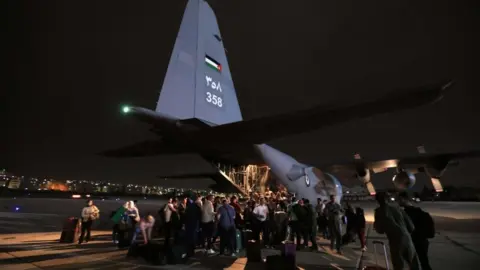Sudan fighting: Diplomats and foreign nationals evacuated
 EPA
EPAA growing list of countries have evacuated diplomats and citizens from Sudan's capital as fierce fighting continues to rage in Khartoum.
The US and UK announced on Sunday they had flown diplomats out of the country.
France, Germany, Italy and Spain have also been evacuating diplomats and other nationals.
A vicious power struggle between the regular army and a powerful paramilitary force has led to violence across Sudan for more than a week.
US authorities said they had airlifted fewer than 100 people with three Chinook helicopters on Sunday morning in a "fast and clean" operation.
The US embassy in Khartoum is now closed, and a tweet on its official feed says it is not safe enough for the government to evacuate private US citizens.
The UK government managed to airlift British diplomats and their families out of the country in what was described as a "complex and rapid" operation. Foreign Minister James Cleverly said options to evacuate the remaining British nationals in Sudan were "severely limited".
More than 1,000 European Union citizens had been taken out of Sudan, according to an update from the EU's foreign policy chief on Monday morning.
Individual countries have given updates on their evacuation operations:
- French President Emmanuel Macron confirmed that a plane had arrived in Djibouti carrying French citizens and others on Sunday - and the government said another evacuation took place on Monday, taking the number of people evacuated to 388
- A handful of Dutch citizens left Khartoum on a French plane, and another with people from the Netherlands on board left early on Monday morning
- Germany's foreign ministry said it had evacuated 311 people, including German nationals as well as those from other countries. It said more flights were planned "if the situation on the ground allows"
- Italy and Spain have also evacuated citizens - the Spanish mission included citizens from Argentina, Colombia, Ireland, Portugal, Poland, Mexico, Venezuela and Sudan itself
- Canada's Prime Minister Justin Trudeau said his government had evacuated its diplomatic staff
- Turkey - a key player in Sudan - began evacuation efforts by road from the southern city of Wad Medani on Sunday, but plans from one site in Khartoum were postponed after a nearby "explosion"
Earlier, more than 150 people - mostly citizens of Gulf countries, as well as Egypt, Pakistan and Canada - were evacuated by sea to the Saudi Arabian port of Jeddah.
Long lines of United Nations vehicles and buses were seen leaving Khartoum on Sunday, heading east towards Port Sudan on the Red Sea and carrying "citizens from all over the world", a Sierra Leonean evacuee told AFP news agency.
South African diplomat Clayson Monyela said ongoing fighting meant that all routes out of Khartoum were "risky and dangerous".
"The airport remains closed, the fighting continues," he told the BBC. "This is why we continue to call for a ceasefire to allow for a safe passage for those who want to get out and to allow for humanitarian aid."
There have been desperate calls for help from many foreign students - from Africa, Asia and the Middle East - who are also stuck in Khartoum, a city of some six million people.
A Nigerian student association in Sudan called on its government to conduct an "immediate rescue mission", saying many students had chosen to flee.
Meanwhile, internet monitoring group NetBlocks said Sudan was in the midst of an "internet blackout", with connectivity at 2% of ordinary levels, which could seriously hinder the coordination of help for those trapped in Khartoum and other cities.
- MAPS: Khartoum violence mapped as civilians flee
- UNSUNG HEROES: How food and medicines are being delivered
- ANALYSIS: The two generals fighting over Sudan's future
- SIMPLE GUIDE: What is going on in Sudan?
The power struggle has seen heavy bombardment in the capital city, with hundreds killed and thousands more injured.
The near-constant shooting and bombing in Khartoum and elsewhere has cut electricity and safe access to food and water for much of the population.
Several ceasefires that had seemingly been agreed by both sides were ignored, including a three-day pause to mark the Muslim holiday of Eid al-Fitr, which started on Friday.
On Sunday, the US announced a disaster response team would be sent to the area to "coordinate the humanitarian response for those in need both within and outside of Sudan."
Samantha Power from the US Agency for International Development (USAID) said the team would work out of Kenya at first, and prioritise getting "life-saving humanitarian assistance to those who need it most."
The World Health Organization says the fighting has killed more than 400 people and injured thousands. But the death toll is believed to be much higher as people are struggling to get healthcare, as most of the city's hospitals have been forced to close by the fighting.
Along with Khartoum, the western region of Darfur - where the RSF first emerged - has also been badly affected by the fighting.
The UN has warned that up to 20,000 people - mostly women and children - have fled Sudan to seek safety in Chad, across the border from Darfur.

Are you are foreign citizen in Sudan? If it is safe to do so, share your experiences by emailing [email protected].
Please include a contact number if you are willing to speak to a BBC journalist. You can also get in touch in the following ways:
- WhatsApp: +44 7756 165803
- Tweet: @BBC_HaveYourSay
- Upload pictures or video
- Please read our terms & conditions and privacy policy
If you are reading this page and can't see the form you will need to visit the mobile version of the BBC website to submit your question or comment or you can email us at [email protected]. Please include your name, age and location with any submission.
